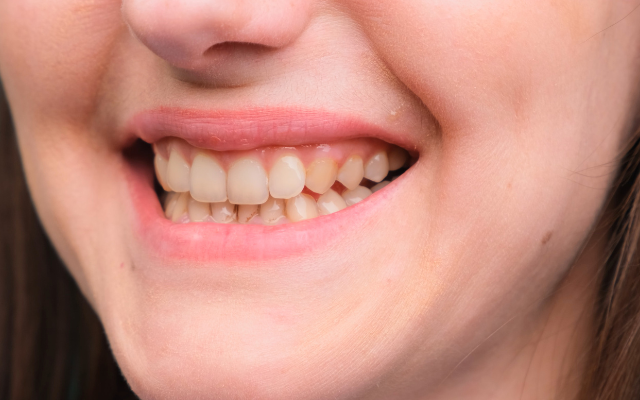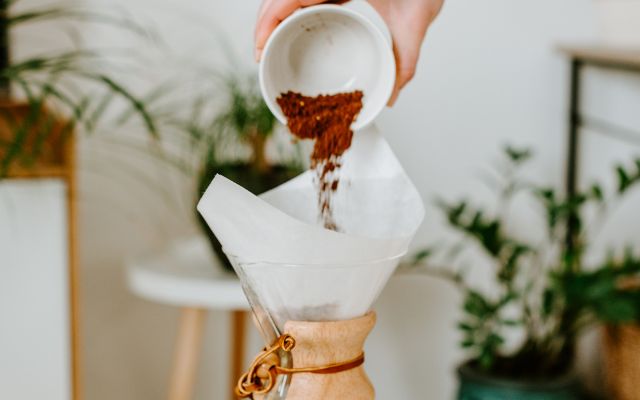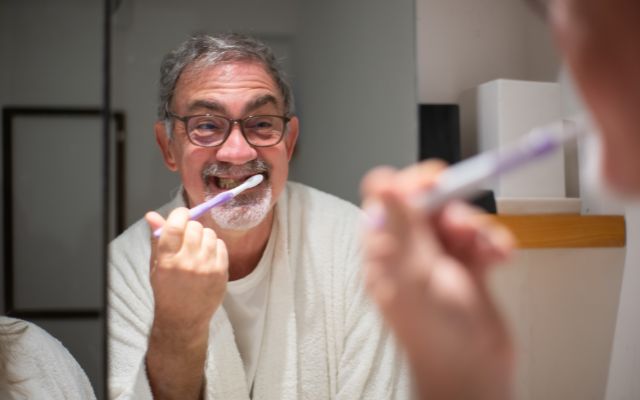Does Coffee Stain Your Teeth? Yes, coffee may have yellow teeth. Coffee may affect tooth health, according to multiple studies. Tannic-dentin research continues at the NCBI. This morning habit may be hazardous because water breaks down tannins, a polyphenol present in coffee, red wine, and tea.
In this post, dentist Spring Orchid will address if coffee yellows teeth and how to treat them.
Does Coffee Stain Your Teeth?

Yes, consuming too much coffee may yellow your teeth.
As revealed by several research studies, the sad reality is that frequent coffee use might have a harmful impact on dental health. The National Center for Biotechnology Information has additional Tannic-dentin investigations.
- Tannins, a polyphenol found in coffee, red wine, and tea, break down in the water, making this morning ritual potentially harmful. Tannins form colour compounds that stain teeth. Coffee stains teeth, even with one cup a day.
- The rich brown hue of coffee is derived from chlorogenic acids and melanoidins, which are produced during the roasting process and can result in staining. These chromogens can discolor teeth by permeating their tiny pores.
Staining Process
The process of coffee staining teeth can happen in a few ways. Firstly, the chromogens like chlorogenic acids and melanoidins found in coffee can enter the small pores on teeth and get lodged in the enamel, causing discoloration over time with repeated exposure to coffee or other dark drinks and foods.
Another factor is the acidity levels in coffee, which can weaken and erode the enamel, making it easier for chromogens to penetrate and stick to teeth.
Lastly, personal oral hygiene practices can also impact the staining process. If teeth aren’t brushed or flossed regularly, coffee and other food and drinks can linger on the surface for extended periods, increasing the risk of staining.
All in all, the staining of teeth from coffee is the result of a combination of chemical composition, exposure, and oral hygiene habits.
Other Coffee Side Effects?

- Coffee has several negative consequences, including but not limited to dulling the appearance of teeth:
- Caffeine may promote oral bacterial growth, which in turn can cause tooth and enamel erosion, resulting in more vulnerable and less robust teeth.
- Bad breath is another side effect of drinking coffee. Finally, don’t worry about giving up coffee. Simply take the necessary measures and schedule routine dental exams.
- Tooth decay is the most prevalent adverse consequence of coffee use on oral health. Caffeine may weaken tooth enamel, making it easier for germs to penetrate the tooth and produce cavities.
How Frequent Consumption of Coffee Can Stain Teeth?
Consuming coffee frequently can lead to the staining of teeth. The more coffee a person drinks, the higher the likelihood of the staining chemicals, such as chlorogenic acids and melanoidins, penetrating the microscopic pores of the teeth and embedding into the enamel.
Daily coffee consumption increases exposure to these staining chemicals, which can accumulate on the teeth over time. The extent of discoloration can vary based on individual factors such as saliva composition, oral hygiene habits, and the thickness and composition of enamel.
To minimise the staining effect, it is recommended to practise good oral hygiene and limit coffee consumption.
At-home Coffee Stain Removal

The potential health risks of coffee stains on teeth are enough to make you consider cutting down or maybe eliminating coffee altogether. However, there are methods available for eliminating such discolorations from otherwise pristine teeth.
Teeth may be whitened at home using the following methods, while professional dental care is still recommended for the best results.
- Toothbrush with baking soda: Twice a month, give your teeth a baking soda and water brush to help get rid of stains. Method: Combine 1 tsp. of baking soda with 2 tsp. of water. Create a paste by combining the ingredients and brushing your teeth with it.
- Gargle with coconut oil: Coconut oil neutralises oral acid and removes coffee and colours. Coconut oil gargling is highly recommended for those concerned with their dental hygiene. Sip coconut oil. Gargle oil between teeth for 15-20 minutes. Spit it out and brush with gentle or coconut oil toothpaste.
- Apple Cider Vinegar: Used properly, apple cider vinegar may whiten teeth and eliminate coffee stains. Gargle with a tablespoon of apple cider vinegar for 10 minutes, then rinse and clean your teeth. Since excess acid may damage enamel, clean your teeth soon away.
How To Avoid Coffee Teeth Stains?

If your teeth have been discoloured from drinking coffee, you’re not alone. Coffee addicts’ teeth deteriorate with time, although these stains don’t emerge straight away. There are times when removing yellowed teeth might be a real challenge. Avoiding their emergence altogether is preferable.
Dentist Spring Orchid will tell you 6 methods for avoiding coffee-related tooth stains:
Add Milk
Your teeth will get more or less discolored depending on the shade of coffee you drink. As a result, milk added to coffee not only helps lighten the color of the drink but also protects teeth from the acids in coffee, which may cause discoloration.
Cow’s milk and other animal-based dairy products are rich in the kind of protein that binds to the polyphenols in coffee. Instead of staying put on teeth and staining them yellow, these compounds make their way to the digestive system to be promptly digested.
NOTE: It’s important to emphasize that this impact is exclusive to animal milk. Soy milk is excellent in coffee, but it doesn’t provide enough protein to prevent tooth discoloration. Many believe milk is more effective with extra fat.
Drink Differently
Coffee can only discolor teeth when it touches them. Coffee in a glass or cup will likely adhere to your teeth, particularly the front ones.
Using a straw to drink coffee reduces tooth contact. If polyphenols don’t touch your teeth, they can’t color them yellow and dark brown, a typical concern for coffee consumers.
Moreover, eating sour foods while drinking coffee or afterward can help remove plaque, and foods like lemons, strawberries, etc. help whiten teeth extremely efficiently and securely.
Low-Caffeine Coffee
Coffee’s high caffeine content is the primary culprit in discoloring teeth. Selecting a decaf or low-caffeine coffee may aid in stain prevention in the long run, as studies have shown that these varieties are less prone to develop yellow stains on teeth. the likes of which you could face.
Because coffee’s polyphenol concentration is proportional to its caffeine amount. Caffeine deficiency reduces polyphenol content, which in turn reduces staining.
- Some stain-reducing brewing methods exist as well. Then provide just one example, coffee prepared in a filter is preferable to coffee brewed in a French pot from a dental hygiene standpoint.
- Brewing cold coffee, in which cold water is used for the extraction process, is the most effective method for reducing staining. While cold brew coffee may take longer to prepare than other methods, it may be worth the wait if you’re concerned about coffee staining your teeth.
Even if you’re a coffee fanatic, cutting down on your daily brew will help keep your teeth whiter. Dentists recommend limiting yourself to 2 cups of coffee a day. You should also limit your coffee consumption to a certain period each day.
Brush After Coffee Using A Better Toothbrush
Removing coffee residue from teeth before it stains is one of the greatest strategies to avoid coffee stains. It’s possible to do this, even if you’re at work, by cleaning your teeth immediately after drinking coffee.
- Otherwise, you may gargle with water or whole milk. This may remove any residue on your teeth if you don’t have time to brush.
- Please wait at least an hour after drinking coffee before you clean your teeth. This occurs because coffee’s acid may weaken tooth enamel in certain people. Brushing your teeth soon after drinking coffee might damage your enamel. It’s best practice to just brush your teeth before you eat.
If you want whiter teeth and less plaque buildup, dental expert Spring Orchid recommends switching to an electric toothbrush.
Maintain Oral Hygiene
Proper oral hygiene prevents tooth discoloration. The American Dental Association suggests brushing twice a day with fluoride toothpaste for 2-3 minutes. Additionally, you should see the dentist twice a year for checkups.
Floss every day as soon as feasible. By eliminating the plaque that has formed in your teeth due to food and drink, flossing may help keep your smile bright and white.
Professional Teeth-Whitening Treatments
Whitening your teeth in the dentist’s office are always going to be the most effective option. Even if you’ve never done anything to your teeth, frequent dental whitening procedures will keep your smile bright and beautiful.
- While at-home methods may get the job done temporarily, professional treatments for tooth discoloration can keep your teeth whiter for longer and protect them from future discoloration. your.
- Home bleaching is cheaper, but it takes longer (7 to 14 days). If you want to bleach rapidly, you may bleach at the dentist, and whiten your teeth the first time, but it’s more expensive. Modern apparatus with laser and bleach helps teeth brighten swiftly (whitening time usually lasts from 90-120 minutes).
The QIP-compliant Spring Orchid dentistry lockout room in Western Australia Spring Orchid Dental Clinic has X-ray, Dently ultrasound, teeth whitening forging, endodontic, and root canal length metres to optimise evaluation and treatment. Spring Orchid also unites a team of highly skilled, experienced, and devoted physicians and experts for patient health.
Contact the Hotline or register online to schedule an appointment at Spring Orchid Dental Clinic.
FAQs
Stopping Coffee Would My Teeth Whiten?
Even with expert teeth whitening therapy, coffee-stained teeth often do not improve in appearance over time. If you have your teeth professionally whitened, however, keeping them that way is frequently as simple as refraining from coffee, tea, and other staining foods and drinks.
What Beverage Does Not Discolor Teeth?
Water is the finest option when it comes to drinks that aid in keeping teeth and gums healthy and free of stains. Stains may be removed by using water to wash away acidic substances, food particles, and bacteria. Water, in contrast to beverages like wine and coffee, is colorless and free of the tannins that may discolor teeth.
Will Extra Brushing Help Whiten My Teeth?
Brushing removes dangerous germs and plaque, not whitening teeth. Your dentist will tell you to clean your teeth twice a day to keep them healthy and free of cavities. However, regular brushing won’t make your teeth much whiter, and whitening toothpaste has even less of an impact.s, and taking them to the dentist for regular check-ups.





